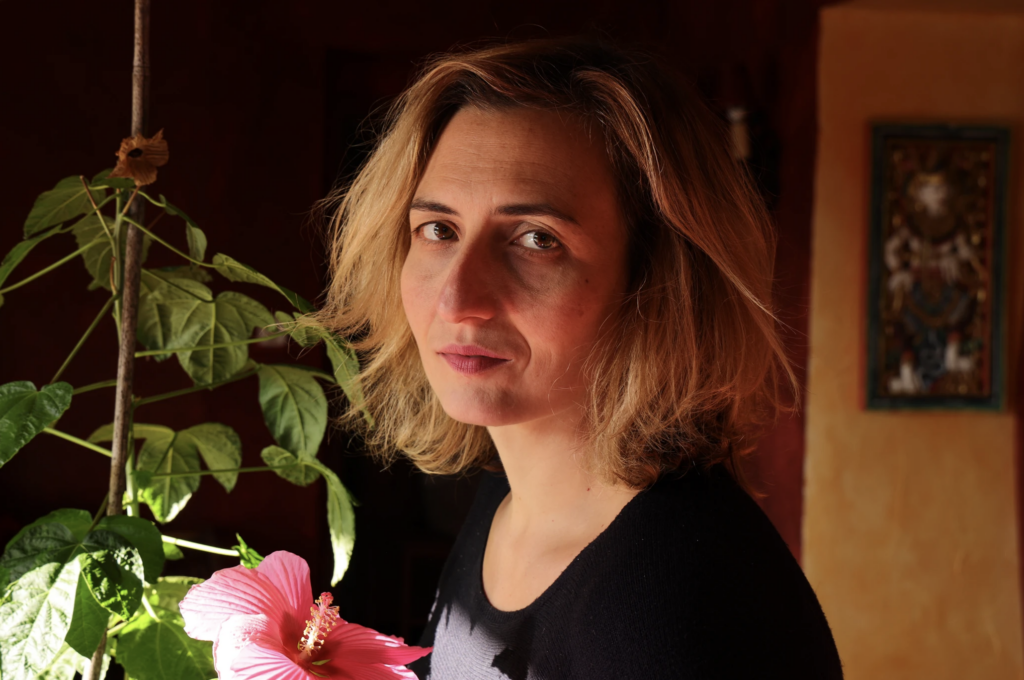
Dr. Eda Elif Tibet is a visual anthropologist, filmmaker, and applied social scientist currently a Swiss National Science postdoctoral researcher at the Wyss Academy for Nature in Bern. She formerly held an Enacting Global Transformation fellowship from the University of Oxford. Dr. Tibet has founded several multimodal visual anthropology initiatives, such as KarmaMotion and the EthnoKino Festival, both significant platforms in European visual anthropology and filmmaking. We recently talked with Dr. Tibet about her varied and inspiring career. In this interview, she shares her personal, academic, and professional journey, impressive accomplishments, unique philosophy, and tips for aspiring fellowship applicants, scientists, and storytellers.
You currently hold an advanced postdoc at the Wyss Academy for Nature, funded by the EU Biodiversa + and the Swiss National Science Foundation. Can you describe a week in the life of a SNSF fellow at the Wyss Academy?
It is amazing to be working at a place with a visionary stance. The senior researchers, directorate, and management leading the academy have figured out how to put research into action under what they called the “Solutionscapes” approach. It feels joyous to be part of the solutions rather than just working on problems. An applied way of thinking is already a true paradigm shift in science. Still, in the early stages, there is ample evidence to see this approach at work across the four program hubs, which are located in East Africa, Switzerland, South America, and Southeast Asia.
I have joined Prof. Dr. Julie Zahringer’s “Land Systems and Sustainability Transformations” team. What the professor does is out of the box, as she has a global approach with much fieldwork across various sites. In such a short time, I learned so much from her, especially during our field mission to Laos PDR together. With much academic independence and freedom, I am encouraged to bring multimodal, visual, and postcolonial frameworks into our research project, Bridging Values.
From a daily life perspective, the location of the academy is fantastic. It is in the old town of Bern, right across from the parliament. Every morning, I cycle to work from home. On the way, I stop by Adrianos, my favorite coffee shop in town, where I start the day with a finely brewed cappuccino. At lunchtime, I’m together with all the researchers at the social hub, which is characterized by a warm, healthy work culture and a family-like atmosphere. It is truly wonderful!
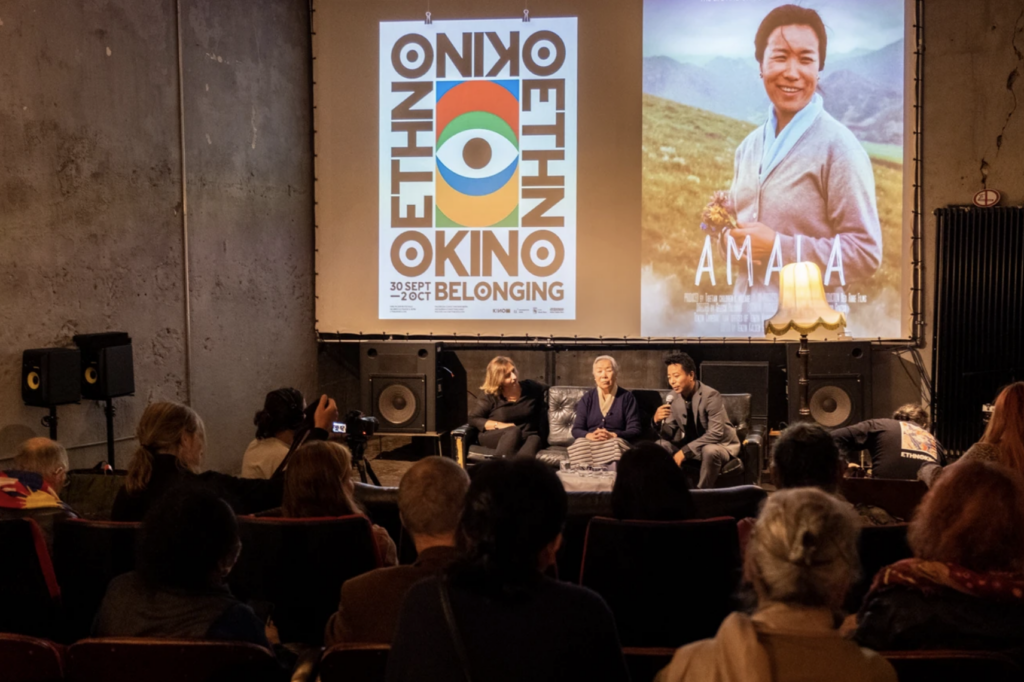
Tell us about your background and professional journey. What led you to this fellowship? How did it advance your career and expand your professional network?
In the science world, competition is fierce. You are racing against the world’s most brilliant minds and competing with other disciplines that equally want to claim money and time for their solutions. Almost everyone has important things to do; they are just as passionate, determined, and dedicated as you are. There is, of course, always a proportion of people investing solely in self-indulged individual careers (ego boosters and records people), but most scientists I meet in the scene are people who have deep societal concerns about the way the world is going right now. They are not happy with that direction, and they want to make things better for the people they serve. I can say I belong to this second group, and this was a major motivation behind my joining academia.
In my case, it must be for that very reason that I became a Swiss National Science Foundation Fellow—twice! First, I got my PhD funded (2015-2019), and now my postdoctoral research (2023-2026) is backed by the SNSF. I am aware of how rare a chance this is. I think it is my unconventional background and innovative approach that stood out. And I have been deeply loyal to my only cause, my not-so-hidden agenda, which is to serve world peace and work towards eradicating superficial yet violent borders. I don’t believe in nationalism; I believe in planet Earth and humanity in unity. We need to leave these segregative, old territorial concepts and turn to seeing each other for who we truly are and standing against racism, institutional supremacy… I say this out loud all the time within my publications, in my films, and even in the film festival, I am curating. After all, if one does not have a noble cause to work for, then what is this all for?
The people who worked with me (professors, founders, employers…) trusted and therefore invested in me. They said, “She’ll do this,” “She’ll go get it,” “She’ll find a solution,” “She’ll make the impossible possible,” “She is gifted, she has a unique gift”… If it weren’t for them, I wouldn’t perhaps have discovered my abilities, but skills are things you build on the go. It is great to have the talent, as it makes it slightly easier to build up your skills, but a clear perspective is really key to any success. One needs clarity: “Why am I doing this? Do I really want to do this?”
One needs to have a life purpose. It can’t just be that you’re talented and you’re doing it just because you can. That’s not going to motivate you in the long run. The marathon runner is someone who has a purpose. So ask yourself, what is your life purpose? Ask this question to yourself again and again. Once you make peace with the answer and sit with it, it is with you for a lifetime, and that very answer is what shapes your path, even if it may change from time to time. Change is inevitable, but the essence will remain the same.
I reflect a lot all the time, and it is not that I am convinced of myself each time; I have always been someone with many inner contradictions due to facing power and trying to overcome brutal authority and oppression coming from others. I always walked on the edge of holding on to things and letting them go. It is really about hope and courage. How courageous are you to dare the limits, to dare to break the status quo, to think the unthinkable when everyone around you is against it or against you, especially if the system is against you—how do you combat it? How is it that you don’t break down, but you break through?
That process of thriving, so to speak, the process of surviving, is what became my biggest learning treasure, what science calls methods, and I am ready to share this with the whole world now. That is why I am starting the Doc Impact Lab for Mov(i)ement Fellows. This is the avenue where I’ll be sharing and motivating all the emerging young talents, those like-minded people who really care about the world and the communities they are serving. I want to tell them, “Don’t worry, you are not alone, there are still many of us who are not into extractivist capitalism, we are free and we are in this together for the long term.”
So, when it comes to answering what has led me all the way, it is the ability to see where the world is going. What are the new discourses, the new trends? You need to be ahead of your time to be able to say and do things before they come into being. So that is what happened in my case. I came out from Turkey with a niche in my hands, intuitively created: a visual anthropologist into conservation, a person who films the lives of nomads, mobile pastoralists, and local livelihoods, and who does this co-creatively and collaboratively.
From there, I moved to mobility justice. During my doctoral studies, I followed the survival trajectories of unaccompanied asylum-seeking youth, young people escaping war and violence. We conducted youth participatory action research, publishing a lot on this topic, and we were recognized for best practices in the field. Simultaneously, with exiled musicians, I filmed Refugee Here I Am (2015) and Ballad for Syria (2017). These films broke records at film festivals and won awards in visual anthropology for their co-creative, co-authored approach.
This experience with “refugees” convinced me that we need bigger change and that it needs to be systemic; we, as only activist researchers, can’t change the world alone, even more so because we get criminalized or dehumanized asking for human rights. But if we learn to make alliances, build coalitions, and engage stakeholders creatively for fairer and more just futures, we could have a chance; there is always hope.
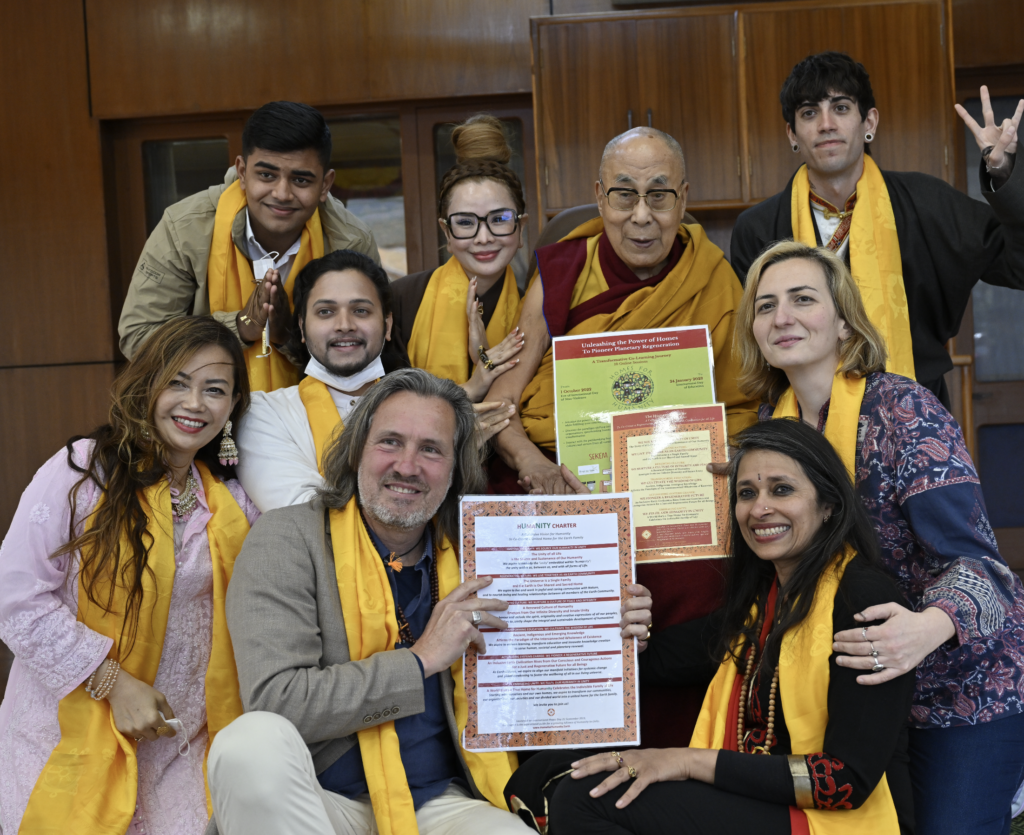
You describe yourself as a multidisciplinary scholar, an applied scientist, and a storyteller who works at the intersections of mobility justice. How did you begin this work, and where do you see it taking you?
It starts with seeing the interconnections. I was never convinced that one could find solutions to complex matters from one expertise, particularly for young scholars from complex countries like myself. It is even more difficult to be still or be satisfied with one approach or one discipline; any attempt will fail you. It was a great excitement for me to find linkages and to take risks (a major part of growth). You can’t grow if you are risk-averse and would like to be in your comfort zone. To be able to stay alive, one needs to be mobile and adapt to change so one can progress.
“Mobility” not only in the sense of moving from one city to another but mobility in every aspect of life, in thinking, in one’s profession, in industry, in relationships, and a step further: one needs to insist on the most unconventional, the most unsaid, the never tried before, to find and create a niche of your own. This seems a hard task because everything has already been said, everything is already known—until you realize nobody actually will ever know anything. Have we discovered the reason behind life? Not yet! It’s still a mystery. But it is this mystery that keeps us curious, so we keep pondering, questioning, and innovating. This is an eternal life journey.
Let’s go further back in time to see where and how the future is taking shape: While I was studying for a BA degree in Economics at Istanbul Bilgi University (which was great fun), I took my first Erasmus exchange fellowship in Switzerland at the University of Bern (2006-2007). This was a turning point; as you can imagine, little could I know then that I would return to Bern! It has been eight years since I came back to do my PhD and now my postdoc.
By then, the land of the Alps was a perfect avenue and host for me to pursue rock climbing, snowboarding, and mountaineering, which were at the center of my life during those ages (17-18). I was having the time of my life. Then, I took a class in human geography from Prof. Stephan Rist, who gave an epic lecture on sustainability. The case study he shared was about farmers committing suicide in India. I cried in class; it tore my heart apart. I wondered how the people who fed the world could be made useless and put in debt to big monopolies. So I promised myself that I’d go to India, meet those farmers, and do my best to support them. I needed to find a way to make that happen, and by great luck, I managed to do an AIESEC internship at the Indian School of Business (2008) in Hyderabad, India.
In Hyderabad, I worked on fundraising and business development with the dean of a top-notch MBA school, where I met the brightest people in India who were passionate about social justice. I learned about Jeffrey Sachs’ Millennium Development Goals, met the charismatic Sadghuru, from whom I heard about inner management and inner engineering for the first time, and saw Obama, who gave an inspiring keynote on development, culture, and leadership. I also became a major fan of the Bangladeshi economist Dr. Mohammad Yunus’s groundbreaking work on microcredit, inspiring me to write my Bachelor’s thesis on the Gramenkota Bank, which works on eradicating poverty among women microcredit borrowers in Bangalore.
I traveled a lot in India and couldn’t get enough of it, so I kept going back. I declared India my second home and needed more of it each time, as it helped me a great deal to connect with my spiritual and artistic self. I then went to the UK with a graduate teaching assistant scholarship to the University of Kent, where I learned about social and visual anthropology, advocacy, and conservation. I connected back to the question regarding my roots: Who was I? Where was I coming from, even before Turkey was modernized? So I studied human-environmental relations in my ancestral homeland, that is, Cappadocia, a UNESCO World Heritage Site, where I’ve done numerous documentary films to date and established a local empowerment initiative called Fairy Dust Cappadocia.
My first film, 28 Days on the Moon (2012), was broadcast on TV, and now I plan to make my first fiction film in the region, hopefully in 2027. So, all in all, my life quest has brought filmmaking, innovation, conservation, and justice together as my unique way of engaging with life and being an agent of change rather than just a mere observer.
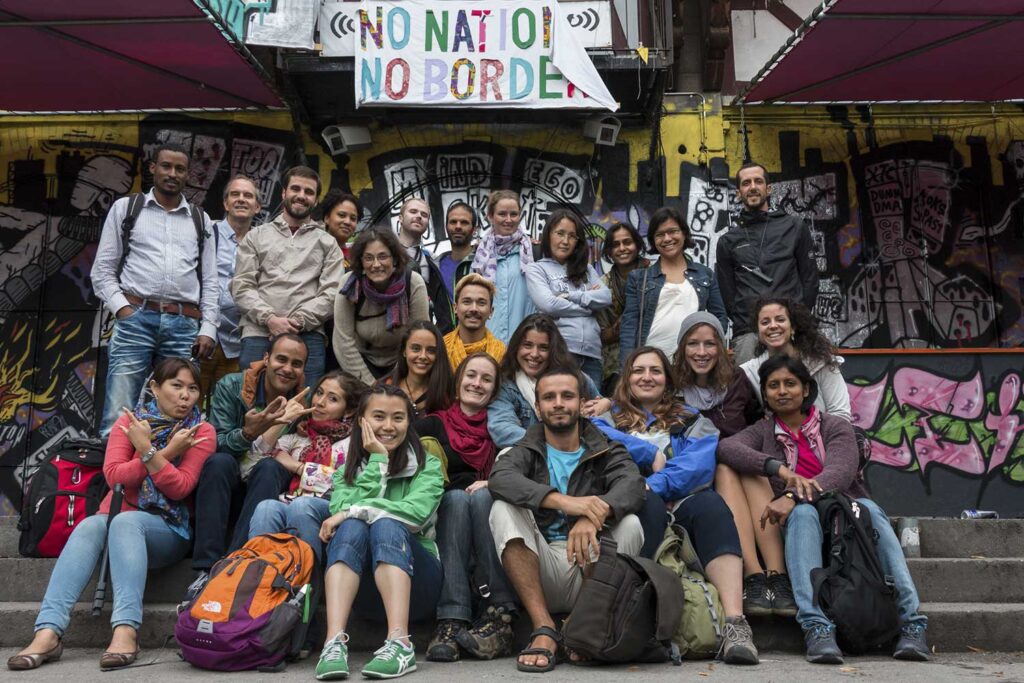
How have your fellowship experiences served your academic and professional goals? How will you incorporate them moving forward in your career?
I have had numerous life-changing fellowships that have served my academic, professional, and personal growth. They have all surely been transformative because they played a big part in my existential quest: How can I serve humanity at my best? How can I become my most authentic self? Where to begin? What am I good at?
I took a Humanity in Action Fellowship (2012) in Denmark with a visit to Sarajevo, Bosnia and Herzegovina. The attraction was twofold: this was the first fellowship I ever heard of talking about “minority rights,” and there was this incredible conference in Bosnia, where my grandmother (on my father’s side) was from. In my search to get to know who I am, this was an incredible, fully funded offer. While I was there, the Syrian war broke out, and it was painful to see what was happening next door. I asked myself, would I just continue being a witness to history’s ugly side, or would I be an agentive actor and work towards enacting change?
Out of the blue (actually, I tend to believe nothing is ever a coincidence), I received my first anthropology job offer through a PhD candidate whom I met at Kent, to work with Tibetan doctors in Ladakh, India. He remembered me because my surname was Tibet. I know it’s kind of a crazy story, but they needed someone urgently to go there, someone who was not fully European but someone who could still deliver skills on how to do financial reports to their donors and sponsors. So I went. It was a once-in-a-lifetime, life-changing experience, and I made my second film, Amchi (2013), based on the journey of a Tibetan doctor providing medicine and teachings in probably one of the most remote regions in the world, way up in the Himalayas. Then I did my third film, this time with Turkish nomads, called Hey Goat! (2014), and met with ethnobotanists doing amazing work on the ground.
Soon afterward, in 2014, I attended world-famous ethnobotanist Dr. Gary Martin’s Global Environments Summer Academy (GESA) Fellowship for environmental change makers, which was deeply transformative. Since then, I have been working closely with Gary through the Global Diversity Foundation, which he founded more than twenty years ago. Together, we have produced numerous films in the wider Mediterranean, including Our Common(s) Story (forthcoming in 2024), videos and publications for Harvest Festival Marrakech, and working towards a trilogy in the High Atlas region of Morocco. Most famously, we produced our award-winning Ait Atta: Nomads of the High Atlas (2020), which was recently broadcast on Arte TV.
Gary is a source of unending inspiration to me; he is a one-in-a-million type of person who has built an entire academy outside academia with a huge impact on the ground as he gave birth to MBLA. This community-driven applied research association is currently busy with providing relief to earthquake-struck villages in the High Atlas. From him, I learned all the mixing and matching of science and the arts, event creation, management, and how to write winning fundraising or research proposals. I will always be grateful for all these teachings, without which I wouldn’t have come this far.
The other more recent fellowship that has truly changed my life is the Enacting Global Transformation Initiative at the University of Oxford, led by Dr. Rama Mani in partnership with her Theatre of Transformation Academy, an association based in Geneva. I don’t know how to describe this lifelong fellowship that has become yet another close relationship, as this is more than academic or self-professional growth; it is ultimately a spiritual union with Rama and her husband, Prof. Alexander Schieffer, a poet and scientist who has written more than thirty books on integral transformation and development, and who is also the founder of Trans4M. They are into transformation work, perceiving human becoming in a holistic sense. They read and travel a lot. They are great listeners, and they take great care of each and every person they encounter individually. They have the most beautiful home one can ever imagine (in France, very close to Geneva), as it is open to humanity and called Home for Humanity. This is a home campus where they give their teachings, curate transformative events, and develop the seedbed of a planetary movement that is in the making. We made an entire documentary film on Home for Humanity out of our common journey. The film will be published in Feb-March 2024.
Both Rama and Alexander are inspired immensely by legendary Prof. Jean Houston, the founder of the human potential movement and the adopted spiritual daughter of the luminary anthropologist Margaret Mead. So, from Mead to Jean to Alexander and Rama, it is with great pride that I am holding the torch and for sure will continue to pass it on to other beloved junior scholars I am currently mentoring.
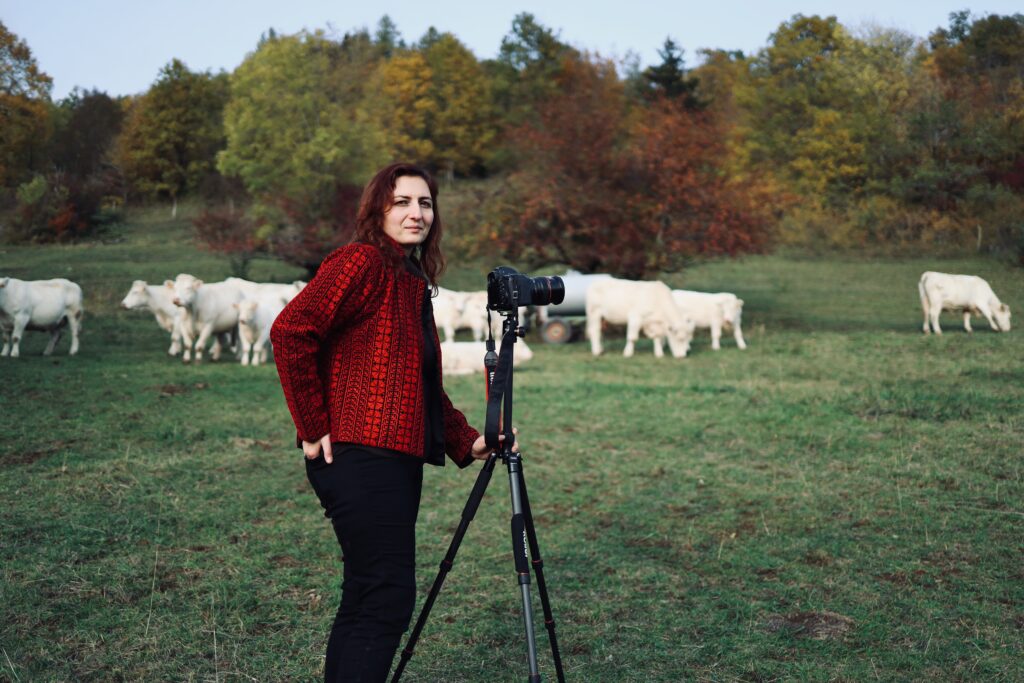
You have founded several multimodal visual anthropology initiatives throughout your career, such as Animating the Commons, KarmaMotion, and the EthnoKino Festival. What inspired you to pursue these projects?
KarmaMotion is a visual anthropology and multimodal media production house that identifies itself as a nonhierarchical collective of media producers aiming to cooperatize knowledge production through engaged scholarship and storytelling. The collective was set up by myself in 2011, with Inanç Tekgüç joining in 2018. Upon our graduation in social and visual anthropology, we came up with the vision that research partners would become equal shareholders in their own stories, narration, and representation.
Following the participatory and collaborative work of luminary visual anthropologists like Jean Rouch, Timothy Ash, and David and Judith McDougall, as well as prominent filmmakers like Dziga Vertov, Werner Herzog, Sergei Parajanov, and contemporary inspirations like Maysoon Pachachi, Tala Hadid, Nuri Bilge Ceylan, Fatih Akin, Tim Burton, Pedro Almodóvar, and Hayao Miyazakiwe, we experimented with our own co-creative and transformative filmmaking style and research approach. The latter usually takes place in people’s most intimate spaces, their homes. KarmaMotion has been telling unique stories in people’s homes as the transformative site and source to begin intimate co-creations since 2011.
We collaborate with nomadic tribal leaders, Tibetan healers, transitional justice experts, catalysts, pedagogues, human rights activists, advocates, musicians, forcefully displaced peoples enduring lives in exile, scientists, journalists, and students from various nations and backgrounds. Our collaborators are, therefore, not the mere subjects of our scientific inquiry. They are seen and received as the partners of knowledge co-creation and mediation. Our engagements also manifest themselves in academic publications, particularly in the fields of media and displacement. We are also the producers of Turkey’s first contemporary anthropology TV program, Antropolojik, which I have anchored since 2020 with Habitat TV. This program has an outreach of 30 million people nationwide.
EthnoKino is dedicated to visionaries and pioneering storytellers across the globe. We are an international action community of practice, working towards systemic change through the power of authentic and meaningful storytelling. Our catalytic home cinema of the commons and commoning film practices intend to co-create a nourishing influential movement for societal cohesion and to enact integral transformation for planetary impact.
Established in 2020 in Bern, Switzerland, the EthnoKino Association is run by award-winning filmmakers, scientists, experts, and storytellers worldwide. EthnoKino also brings the globally recognized EthnoKino Film Festival, which screens trailblazing and award-winning films with an authentically visionary concept.
We aim to explore and publicize critical scholarly and artistic perspectives of various life views and cosmologies through “filmic” means and, by doing so, to actively contribute to social cohesion, diversity, inclusivity, and emancipation within Swiss society and beyond. We believe that independent and authentic storytelling builds solidarity and engages audiences meaningfully, as it broadens minds and horizons. We seek to amplify the power of stories by facilitating funding, collaboration, and impactful outreach.
Academically, EthnoKino is hosted by the Institute of Geography’s Animating the Commons applied research initiative, through which I have been developing a cinema-based pedagogy in the form of a new mentoring and training program called the Doc Impact Lab for Mov(i)ement Fellows. Expanding our screenings from Bern to Berlin, Mexico City, Patagonia, Marrakech, Cappadocia, and Istanbul, we will take our fellows on a global journey as an ever-growing network of Partners and Community, forming its current association.
We will continue to support independent and transformative stories to be written, screened, and shared to shift behavior and catalyze action.
What advice do you have for others interested in applying to fellowships and pursuing projects like yours?
If you, my young friend, who has been reading these lines so far, are still reading, please go on and challenge yourself, take all the risks, and be notorious. There is nothing more wonderful in life than to keep learning, experiment, and be free in all of it. Don’t listen to those who say, “You can’t do this,” “You can’t be that,” or “It’s too difficult.” Don’t let other people’s concerns stop you from your deep quest for who you could be and truly become. There is nothing more joyful in life than realizing yourself and then helping others, friends and loved ones, to be able to do the same.
Be free, free your mind, unlearn everything you think you learned, and keep repeating; start it all over again. Follow the sacred signs; life will keep showing you occasions and moments of luck so that you will be at the right place at the right time. It is all about your synchronicity with life and the universe, trust in yourself, trust in your gut, and be a good person because good energies attract similar energies while negative thoughts attract negativities. Try to purify yourself from all toxications you receive—not easy, I know, but good deeds for good seeds are the essence of boundless creativity. One can not create if one has no courage and has no beauty in how he/she/they look at the world. And creativity feeds itself from relationships. It is our connection to the world that inspires us. Our friends, comrades, allies, and even enemies inspire us to come up with new ideas and initiatives. And once you go through such journeys, something inside you will change, and you will be transformed, surely, each time for the better.
Interested in other Anthropology fellowships? Check out 10 Anthropology Fellowships for Social Scientists at All Career Levels! Create a ProFellow account and bookmark the ones that interest you!
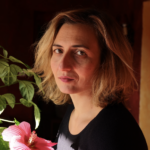
© 2024 ProFellow, LLC. All rights reserved.